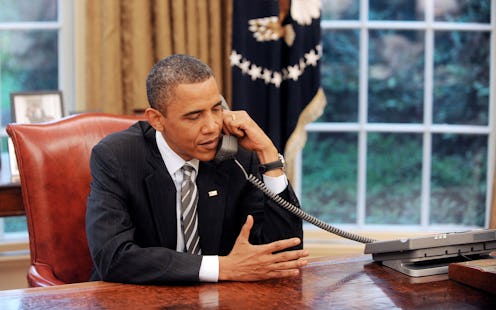News
Obama and Iranian President Have Cosy Phone Chat
Looks like America and Iran might be friends again!
On Friday afternoon, President Obama and Iranian President Hassan Rouhani shared a productive phone call, marking the first top-level interaction between Iran and America in thirty years. Then they told all of their friends about it, just like excited teenagers.
Well, in Rouhani's case, he told all of Twitter, saying that the two shared a mutual goal to "solve the nuclear issue." Obama has said that he won't allow Iran to possess a nuclear missile, and Iran has fought back by insisting that its program is for the sake of "peaceful energy." The two are now on track to hammer out a negotiation, which would likely see Iran allowing American or international access to the details of the nuclear program, with the aim to establish transparency between Iran's program and the rest of the world.
It's been a good week for Iran-American relations all round. Officials from both the U.S. and Iran are hailing Thursday's meeting between Iran's Foreign Minister and Secretary of State John Kerry (and other Western officials) as a success. British Foreign Secretary William Hague was upbeat, calling the meeting "extremely good."
Praise from the U.S. and Iran was a bit more muted, but still overwhelmingly positive. Thursday's talks were described as "constructive" on both ends, but both sides also acknowledged that restoring a relationship between the two nations would be a gradual process. "Needless to say, one meeting and a change in tone, which was welcome, doesn't answer those questions yet and there is a lot of work to be done," Kerry said.
Diplomatic relations between the two countries had largely been on hold since Iran's revolution in the late 1970s and the storming of the U.S. embassy in the country, which resulted in a hostage situation in 1979.
Iranian Foreign Minister Mohammad Javad Zarif made a short presentation to the Security Council on Thursday on a range of topics that included Iran's desired outcomes for renewed relations and plans for addressing the country's nuclear program — a major sticking point for the United States when it comes to diplomatic relations. Kerry called the presentation "very different in tone and very different in the vision that he held out with respect to the possibilities of the future."
"We hope to be able to make progress towards resolving this issue in a timely fashion based on respecting the rights of the Iranian people to nuclear technology for peaceful purposes, including enrichment. And, at the same time, making sure that there is no concern at the international level that Iran's nuclear program is anything but peaceful," Zarif said after the meeting, adding "I am optimistic...Now we have to match our words with actions.”
Another meeting to discuss renewing the relationship between Iran and the West is set for mid-October in Geneva.
